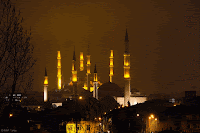As a result of the war, the State of Israel controlled the area that UN General Assembly Resolution 181 had recommended for the proposed Jewish state, as well as almost 60% of the area of Arab state proposed by the 1947 Partition Plan, including the Jaffa, Lydda, and Ramle area, Galilee, some parts of the Negev, a wide strip along the Tel Aviv–Jerusalem road, West Jerusalem, and some territories in the West Bank. Transjordan took control of the remainder of the former British mandate, which it annexed, and the Egyptian military took control of the Gaza Strip. At the Jericho Conference on 1 December 1948, 2,000 Palestinian delegates called for unification of Palestine and Transjordan as a step toward full Arab unity. The conflict triggered significant demographic change throughout the Middle East. Around 700,000 Palestinian Arabs fled or were expelled from their homes in the area that became Israel, and they became Palestinian refugees in what they refer to as the Nakba ("the catastrophe"). In the three years following the war, about 700,000 Jews emigrated to Israel.


